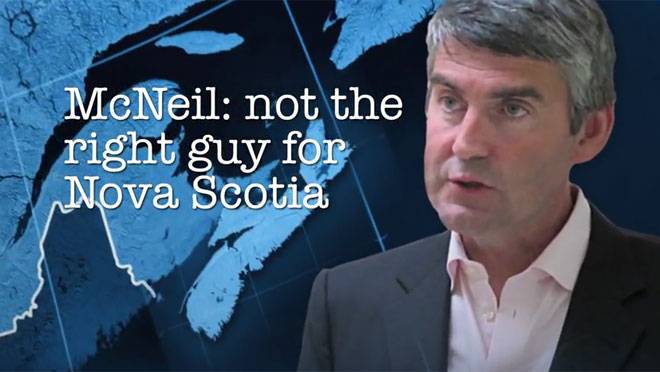Pictured above: A screenshot from an NDP television ad targeting Liberal leader Stephen McNeil from the 2013 provincial election campaign.
Written by Mark Coffin.
After last night’s provincial election debate, I want to reflect on the kind of thought (and thoughtlessness) that goes into crafting a political attack. Attacks say more about what politicians think of the voters than what they think of their political opponents.
After last night’s debate, I want to reflect on the kind of thought (and thoughtlessness) that goes into crafting a political attack. Attacks say more about what politicians think of the voters than what they think of their political opponents.
A month ago, I wrote a blog post about how our winner-take-all electoral system encourages attack politics. Better systems will create better results, but ultimately, change comes first from the people within systems.
When I say attacks, I mean intentional distortions of the truth. Attacks manipulate our thinking with half-truths and have us blindly consider a narrow selection of the facts, or as Jon Lovett says, “rhetoric that is just true enough not to be a lie.” Attacks draw conclusions with the reckless use of hyperbole. They are groundless and superficial assaults on the character of another human being, most often with statements that can never be proved. They are arguments that are shallow and have no logic to stand on.
Statements that draw criticism on well reasoned grounds without these distortions are fair game. While some use the term “attack” to mean an attack on the logic or the argument of an opponent, for simplicity, when I use the word, I mean every other kind of attack.
In terms of last night’s debate, you might also label as attacks any questions that are posed to political opponents solely for the purpose of creating a false understanding of reality among the audience. These questions force the opponent to either react honestly (which is what we want) but lose the votes of the uninformed, or dodge the question and snap back with another attack.
People who are only “just annoyed” with attacks, or say “it’s just part of the game” are underestimating how much these attacks tell us about those who use them.
Attack ads are more than just annoying. Younger siblings are annoying. Your friend with the whiny voice is annoying. Missing the bus because you tripped on the way out the door is annoying. Things that are “just annoying” are problems that we all face, but more often than not, these things are nobody’s fault or intention.
Attacks, on the other hand, are intentional messages created by those who seek to gain power, grounded in a belief that it will increase their chances of doing so.
Attacks are strong indicators of what party leadership believes about the voters. To paraphrase a friend and former politician: our problem isn’t that people can’t trust politicians, the problem is that politicians are afraid to trust people.
Attacks underscore this message. Here are two of most telling things that attack ads say about what politicians might think of us:
1) Enough of us are “that stupid”
A good attack isn’t meant to target those of us who dismiss them outright. Instead, they’re based on a calculation (however sloppy) that there are more voters who believe the message than not.
They’re grounded in the belief that for each one of us that grumbles about the quality of public debate, there are as many or more who actually think that (as the Liberals say) our power rates have risen thirty percent under Darrell Dexter (it all started with Rodney); more of us that believe the daily Metro is enthusiastically endorsing the NDP and discrediting the other parties on their front page (it was an NDP ad buy); and more of us (according to the PCs) that will believe Stephen McNeil is no braver than a chicken.
Most of us probably like to think that our friends and neighbours are smart enough to know better. Politicians that use attacks don’t agree.
2) Democracy is just a means to an end
For those of us who don’t fall for the attacks, we’re left feeling more cynical about the democratic process every time we see one. If attack ads don’t impact how you vote, they might just cause you to check out of the whole process. And if you were more likely to vote for someone other than the person who initiated the attack, that’s the point.
This is often the case for would-be supporters of the “attacked”. Attacks aren’t changing how we vote, but they are causing more of us to stay home. While total voter turnout might go down as a result of an attack, the party that initiates the ad may improve their share of support among those who actually turn up to vote, which to them is all that matters. It’s legalized voter suppression.
In both of these cases, attack ads demonstrate a reckless disrespect for citizens and the democratic process.
We need a change in mindset among any politicians who want to do politics differently (and they all say that they do). I have friends working on campaigns, some running as candidates, for each of the parties who are disappointed in the quality of public debate in this election. Here are some questions for consideration:
– how would the political conversation shift if campaigns treated votes less like prey to be captured, and more like medals to be earned?
– how would things change if political leaders approached these discussions with the presumption that we’re all smart enough to handle it?
Hint: think of that episode of the West Wing where President Bartlett yells at the consultant who tries to dumb down his speech: “It’s not our job to appeal to the lowest common denominator, Doug. It’s our job to raise it.”
Similarly, it’s not a political candidates’ job to try and manipulate the democratic process, it’s their job to respect and strengthen it.





